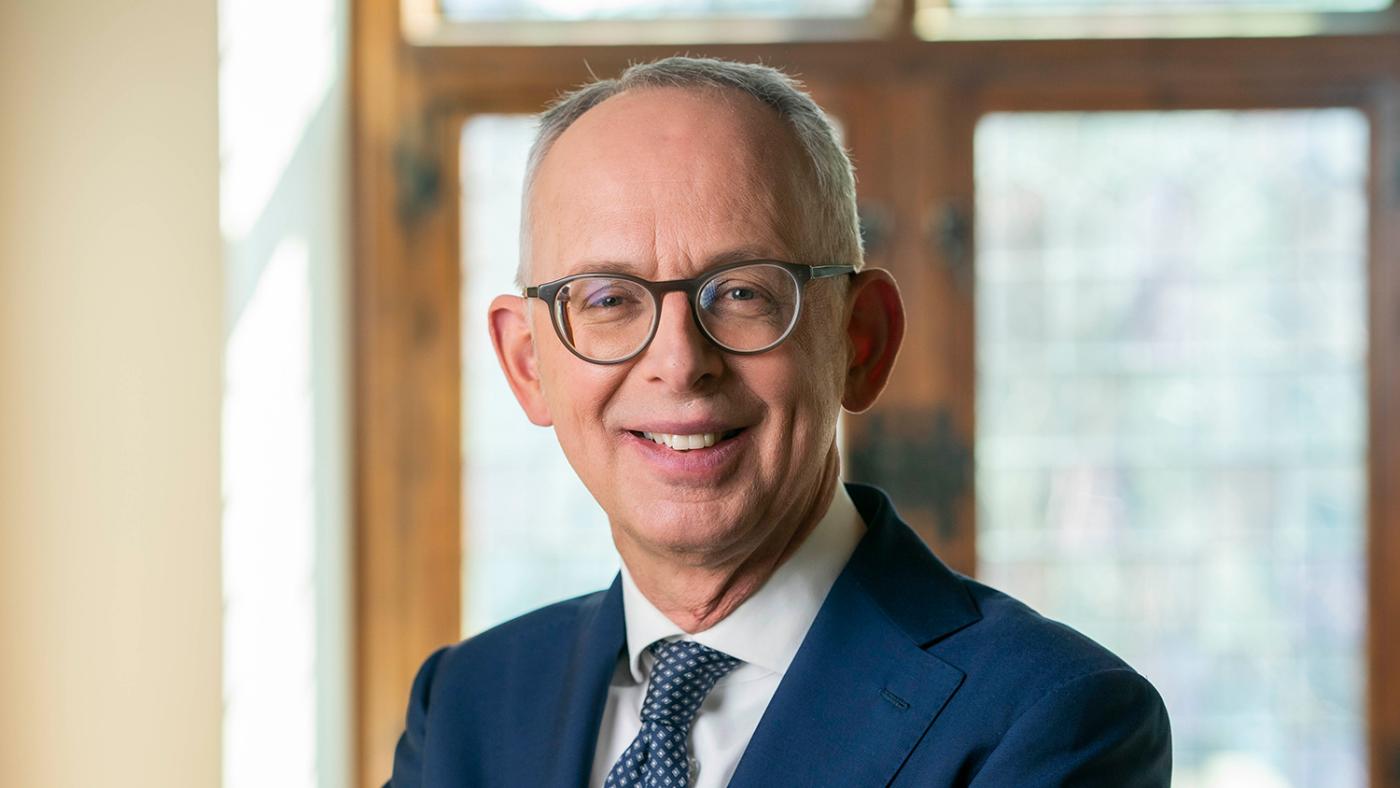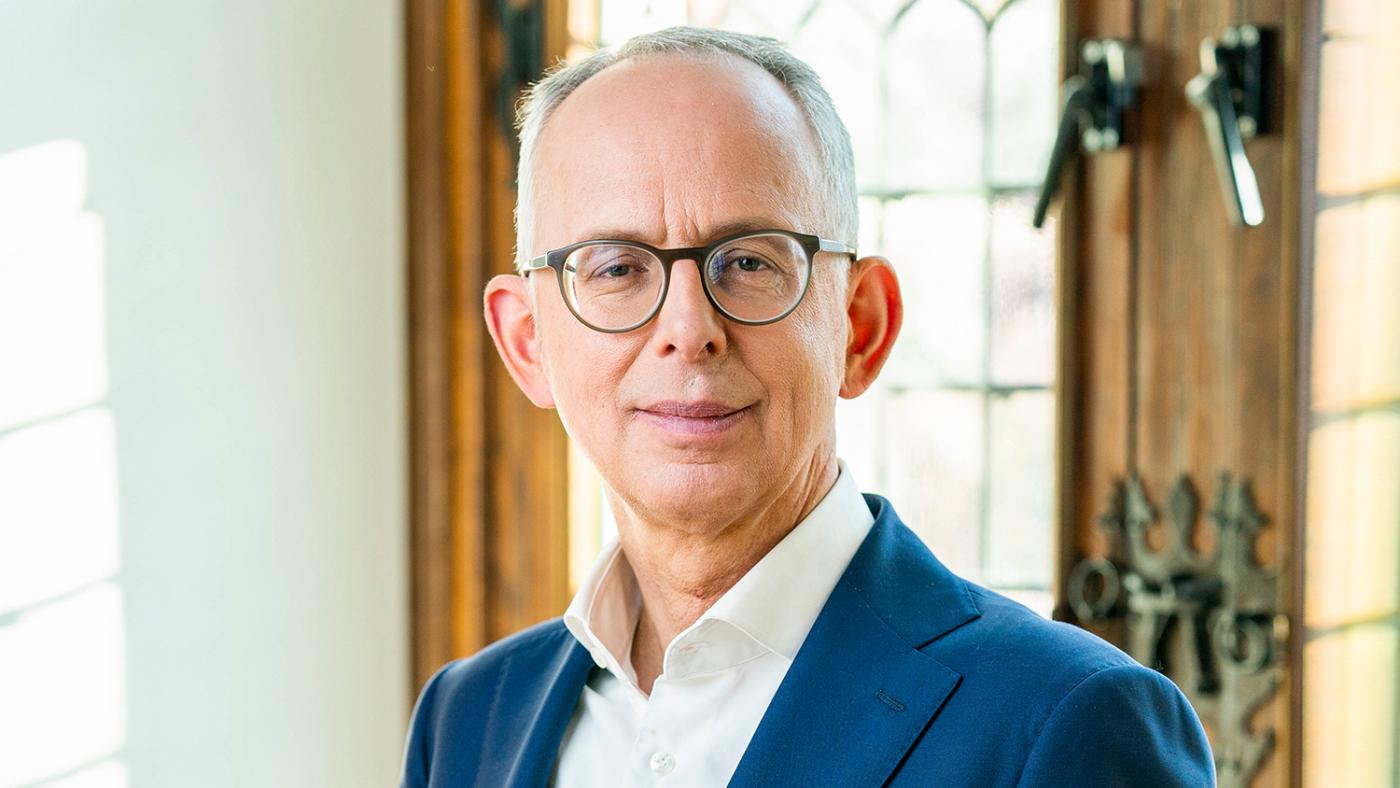Universities are in danger of getting caught up in a political battle, says UU professor Mark Bovens
'Let's not make internationalisation an article of faith’

Shortly before the summer of 2016, in a lecture hall at Janskerkhof, Mark Bovens strongly criticised the unbridled internationalisation of academic education in the Netherlands. He said that universities are isolating themselves from a significant chunk of Dutch society with their preference for English-taught education. His contribution as a co-referent to a meeting on the globalisation of higher education prompted DUB to interview him at the time (article only available in Dutch, Ed.).
Seven years later, universities are struggling to react to proposals and motions set forth by the three political parties currently trying to form a coalition government aiming to limit the number of international students and the number of English-taught study programs. All the more reason to visit the Professor of Public Administration, who stepped down as a member of the Scientific Council for Government Policy (WRR) earlier this year.
Legitimate objections
We're sitting at a packed Faculty Club. Bovens enjoys a cup of soup while he analyses the situation. In his view, saying ‘I told you so’ would be a step too far, but he agrees that the objections he made at the time have become “even more urgent” and “politically important”.
In addition, the reactions of Dutch academics to the critical voices coming from The Hague about the internationalisation of universities are anything but reassuring. “Take the open letter that was written by the Young Academy, for example. What a pity that they pay no attention at all to legitimate objections to internationalisation.”
Such as...?
“Well, I think it’s okay to question the rising number of international students. Is it justifiable that Dutch taxpayers’ money is being spent to educate the children of upper-middle-class citizens from neighbouring countries, as is often the case? Much of that influx is due to a massive increase in tuition fees in the US and Great Britain, which makes the Netherlands a cheap alternative to obtain a second Master’s degree and thus improve your competitive position in the labour market. This way, we are contributing to increasing inequality. Those public funds could have been invested in vocational education institutions.
“I would very much like to see universities not make internationalisation an article of faith. Let's acknowledge that there are legitimate questions to be asked about the number of international students, including questions regarding its consequences for the housing market. Internationalisation is essential for certain social sectors and fields of study, of course, but, in other cases, it is legitimate to ask the question: 'In whose interest is this after all?'"
Aren’t you too tough on universities? Many of them do acknowledge that internationalisation has gone too far in certain cases. For example, they are asking the Minister of Education for mechanisms to establish a limited number of spots for English-taught programmes.
“That’s true, and I also see that universities are struggling with this subject. At the same time, they have caused the situation themselves by creating English-taught programmes on such a large scale. There is a simple way to limit the influx of foreign students, and that's offering more Dutch-taught programmes.
I would welcome that for other reasons as well. We are doing society and many students a disservice by no longer teaching students to think, talk and write in Dutch. In certain fields, such as my own, Public Administration, but also Law and Medicine, professionals must communicate with citizens in Dutch. They have to learn that. The same is true for many psychologists.
Besides, language is not neutral. The introduction of English as a language of instruction implies that American themes and theories will become more dominant. International staff and students don’t read Dutch texts and thus have a harder time doing fieldwork. As a result, the focus shifts to topics that interest an international audience and less attention is paid to issues that are relevant in the Netherlands or Western Europe.
Let's take my field as an example one more time. More civil servants are working in municipalities and provinces than in the whole of the European Union, and local government is much more important to citizens. Yet, in our country, much more research is conducted on the EU than on local government. That's because research on the EU makes it easier to publish in English and establish an academic career, compared to research on Dutch municipalities."
Why do you consider the debate about foreign students and the language of instruction risky for universities?
“About ten years ago, I wrote a book alongside my colleague Anchrit Wille, titled Diploma Democracy. In this book, we've shown that people who have academic diplomas and people who have practical diplomas have increasingly been living in separate worlds. They tend to live in different neighbourhoods, attend different schools, and watch different TV shows. They are also marrying each other less and less. A new sort of pillarisation has emerged, with not three but two pillars: those academically trained and those practically trained. Education is the new form of pillarisation.
Now, this dichotomy is being expressed politically more and more. Parties such as PVV and BBB mostly attract voters with vocational education diplomas, while parties such as Volt, D66 and PvdA/GroenLinks attract those with higher education diplomas. Until the turn of the century, many working-class voters still voted for PvdA and the Socialist Party, but today they vote exclusively for nationalist parties.
What I’m afraid of is that universities and the subjects that matter to them will be caught up in this political conflict going on between cosmopolitans and nationalists. Once upon a time, each pillar had its own university: VU (Christian), Radboud University (Catholic), and UvA (which had a left-wing image). Now, all universities are related to one of the two pillars. Just look at the results map in the latest Dutch elections: the only green cities are the ones where many students live. Universities and the cities where they are based are being increasingly seen as strongholds of cosmopolitan, internationally oriented citizens.”
What should universities do?
“Academics should be much more aware that their agenda and environment do not correspond to those of large segments of our society. The topics they are concerned with are not necessarily the ones that matter to other groups.
This is an important task, especially at Utrecht University. Relatively few first-generation students study in Utrecht and UU's hinterland is one of the richest and most highly-educated regions in the Netherlands. This means that our students come from a very one-sided world. To put it bluntly, they think that everyone in the Netherlands is also a member of a hockey club. If you work as a psychologist, physician or lawyer later on, that's a problem.
The university could put more effort into social internships, for example. I used to say to first-year students: ‘Time to get serious, time to start reading the NRC newspaper’. Nowadays, I say ‘Time to get serious, time to get to know the other half of the Netherlands’. For example, I advise students not to work at a café where many students work, but take a part-time job in healthcare, as a cleaner, or as a courier instead."
More, the university really needs to take a look in the mirror. Our strategic plan is full of nice words about inclusivity and UU as a community. However, many canteen employees were laid off by Eurest (article available in Dutch only, Ed.) at the time the strategic plan was being written because university buildings were closed. They were allowed to come back after the pandemic, but holding paltry zero-hour contracts.
To sum up, the dichotomy is also reflected inside the university. Protests have been held to demand more permanent positions for scientists, but none were held for the members of the university community with practical training, such as canteen staff, cleaners, and porters."
So, we need to be more aware of the interests of other societal groups?
“Yes, whether it’s about the research agenda (we may forget that the costs of the climate transition often hit those with practical education harder) or how we deal with people who also work for the university but have no academic training. That requires more effort, more effort than we used to.
Think of it as a moral appeal, but it is also politically sensible. If the discussion on internationalisation focuses entirely on the interests of one of the two pillars, we should not find it strange that the following cabinet goes: ‘Hey, how do those universities contribute to solving the problems that are noticeable for large groups in the Netherlands?”’

Fewer highly-educated people in the Dutch Parliament
In his book Diploma Democracy, Mark Bovens points out the dangers of a Parliament increasingly dominated by highly educated people. The latest elections in the Netherlands have shown “a correction” to these imbalances, he notes.
“But it’s marginal. After the 2021 elections, 77 percent of the members of parliament had a university background and 16 percent had a higher professional education degree. Only one-third of the voters have a university or college degree. After the latest elections, 69 percent of MPs have an academic education and 17 percent have a college degree. There are now a few more vocational students and a few more MPs with practical professions, of whom the most famous example is a manager of a poffertjes stall. This increase is almost entirely due to BBB and PVV.
In our book, we wrote that the dominance of academics in politics would lead to resistance. If we’re lucky, resistance will come through moderate nationalist parties looking to operate within the democratic system of the rule of law. As far as I’m concerned, Leefbaar Rotterdam (Liveable Rotterdam, Ed.) is a good example of this. That is a party which has taken political responsibility and is now sitting in the city council alongside Denk. I think that’s a great development, it keeps the practically educated voters connected to the political system.
But there is also a risk of parties emerging which oppose the entire system. Then you have a big problem. That’s what’s threatening to happen with Trump. In the United States, the democratic rule of law itself is getting caught up in the struggle between East and West-coast liberals and what they call 'fly over-country': practically educated citizens do not feel represented.
My hopes were pinned on an election victory for BBB and NSC. Certainly, the rise of Caroline Van der Plas’ party is easy to understand in the light of what we described in our book. This is someone that practically educated voters can identify with. With PVV in the cabinet, the rule of law is not necessarily in safe hands. We’ll have to see how that plays out.
What we are already seeing in the National Voter Survey is that trust in politics among practically-educated PVV voters has grown strongly. The same increase was identified in 2010, when PVV supported the cabinet. Conversely, I expect confidence among highly educated people to decline.”
Mark Bovens will give a lecture on March 26 as part of the celebrations of UU's anniversary (Dies Natalis). It is titled 'The Unwritten Rules of the Democratic Rule of Law'. Therefore, he will be not discussing the same topics he talked about in this interview.